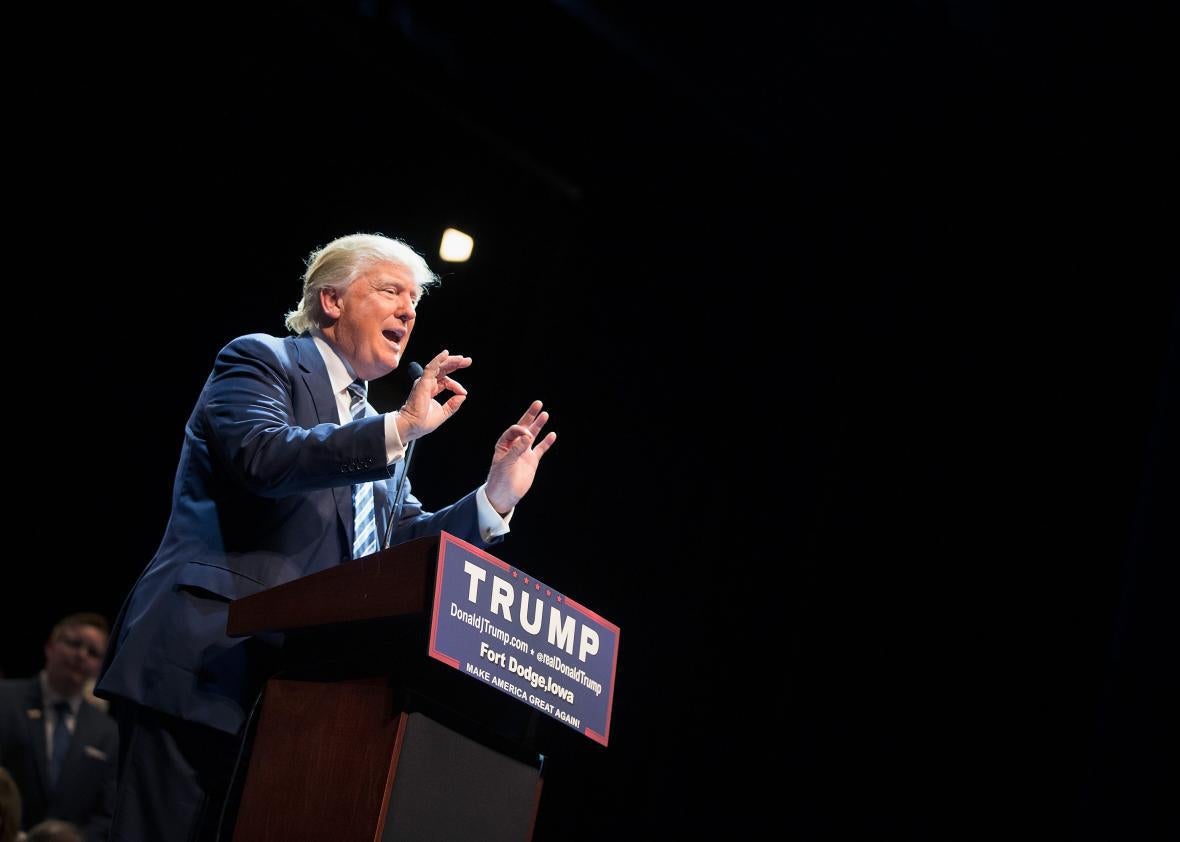It’s not hard to read between the lines of this tweet:
To wit, Trump is reminding the Republican Party that it better tread carefully when talking about his candidacy and his controversial—not to mention racist and likely unconstitutional—plan to ban Muslims from entering the United States. Trump’s been openly using the threat of an independent, third-party run as leverage since he jumped in the campaign, and the meaningless GOP loyalty pledge he signed in September has done nothing to change that. As he told ABC News last month after rumors surfaced that GOP powerbrokers were looking to band together to take down his campaign: “I will see what happens. I have to be treated fairly.” He was even more specific on Twitter about what he saw as an unfair attack on his campaign: “That wasn’t the deal!”
It’s unclear to what degree the RNC and the rest of the GOP field believe Trump would actually go through with his threat and how much they’re simply afraid of alienating his loyal band of angry supporters. Regardless, Republicans are clearly afraid to cross him, since either scenario risks handing the general election to Hillary Clinton. For all the harsh words they’ve used this week, it’s telling that no one of note in the GOP has been willing to say he or she wouldn’t vote for Trump if he were the nominee, even as he’s suggesting we should bar roughly a quarter of the world’s population from stepping foot on U.S. soil.
The fact that pundits and politicos aren’t dismissing the third-party threat out of hand, though, is a helpful reminder of two things: 1) No one knows what Trump will do or what exactly he even wants; and 2) the real estate tycoon would be able to make a third-party run without breaking the bank.
If Trump were a normal candidate, no one would take a third-party threat seriously, since an independent run would doom his own party while offering himself no path to the White House. The new USA Today/Suffolk University poll he boasted about on Tuesday suggests he might be able to retain nearly 7 in 10 of his current supporters. There’s plenty of reason to doubt that retention rate would actually be so high, but even if we generously assume he would be able to keep all of his fans, he’d still have no chance at victory. To state the obvious: If Trump doesn’t have enough support to win the GOP nomination, he won’t have enough to win a general election. (To say nothing of the fact that it takes considerable time and money to get your name on state ballots, or that so-called “sore loser” election laws would likely prevent him from even appearing on the November ballot in Ohio and Michigan if he runs in the states’ GOP primaries this spring.)
Trump, though, has already proved he isn’t bound by such campaign logic. Few thought he’d actually declare his candidacy, and he did. Few thought he’d file his financial disclosure forms, and he did. Few thought he’d give up hosting his reality show to stay in the race, and he did. Regardless of whether you think Trump is crazy or crazy like a fox, we can all agree that there’s a nonzero chance he’s crazy enough to launch a third-party run.
What often gets lost in the horse-race coverage is that for all Trump’s talk of “winning,” he’s not playing a zero-sum game. He’s already secured a heck of a consolation prize in the form of around-the-clock media coverage and the implicit validation that comes with it. It’s also clear he doesn’t want his time in the spotlight to end—as he told the Washington Post in an interview published Wednesday: “I. Will. Never. Leave. This. Race.” For a man obsessed with his own image, it’s difficult to put a price on all the attention. The bigger issue, though, is that Trump hasn’t really had to.
For all the talk of his ability to finance his campaign, he’s currently getting a relatively free ride. He seeded his campaign with about $1.9 million but reported contributing just $100,779 during the past fundraising quarter. (Meanwhile, his campaign brought in a total of $3.6 million from people not named Donald J. Trump.) While his rivals and their affiliated super PACs are spending millions to get their faces on TV, Trump gets significantly more airtime simply by picking up the phone and calling one of the cable news networks. A third-party run would cost more than the $2 million he’s invested so far, but Trump clearly has the money it would take. He could also do it on the cheap if the goal isn’t to win but merely to look strong enough to be treated like a major candidate by the political press.
None of that is to say Trump will launch a third-party run, just that the past several months—and the past several days in particular—have proved that no one knows what he’ll do, perhaps not even Trump himself. While Republicans are terrified of giving him a reason to stick around once they nominate someone else, they should be just as worried that they won’t be able to give him a reason not to.
Elsewhere in Slate:
- Trump’s No-Muslims-Allowed Plan Is the Logical Conclusion of GOP’s Anti-Immigrant Anger
- Terrorism Is Bringing Out the Worst in Voters All Over the World
- The Islamophobe Behind Trump’s Hate
Read more of Slate’s coverage of the GOP primary.
